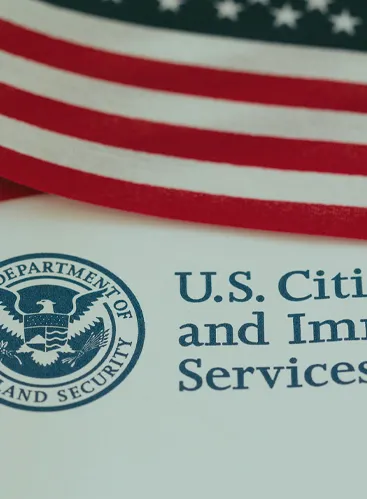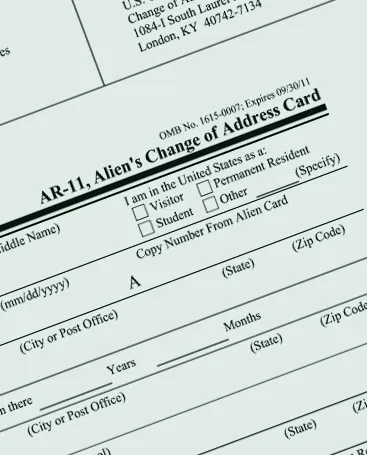MON – FRI (8am - 6pm)
Notifying USCIS of a divorce is crucial if your immigration status depends on your marriage. Failing to do so can result in application denials, status complications, or removal proceedings. Promptly updating your marital status ensures compliance and transparency with legal requirements.
Delaying the notification of your divorce to USCIS can raise suspicions about your marriage's validity, especially for conditional residents. Promptly reporting ensures compliance, avoids potential complications, and protects future applications. Get in touch with Serving Immigrants for experienced legal advice.


For immigrants with residency or visas based on marriage, a divorce can significantly impact their legal status, especially for those holding conditional green cards tied to their marriage.
When a marriage ends, USCIS expects the affected individual to notify them and, where applicable, submit Form I-751 (Petition to Remove Conditions on Residence) with a request for a waiver due to divorce. See How Form I-751 looks
USCIS reviews divorces to confirm the marriage was genuine, and applicants may need to provide proof. Failure to address this can result in denial or deportation. Consulting an immigration attorney ensures compliance and minimizes risks.
You can notify USCIS of a divorce through different methods. The approach you take will depend on your situation and the USCIS office handling your case.
Note: Always use certified mail to track delivery and keep a copy for your records.
Having the right documents ready will streamline the process of notifying USCIS:
A certified divorce decree proves marital dissolution. If filing a Form I-751 waiver, include joint records to show the marriage was genuine.
Supporting evidence can strengthen your case, especially if USCIS requires proof of a good-faith marriage.
Divorce affects conditional green card holders, especially near the two-year expiration. USCIS requires filing Form I-751 to remove residency conditions.
These documents help USCIS determine that your marriage was genuine and not solely for immigration purposes.
USCIS scrutinizes divorces to ensure marriages were genuine, not for immigration benefits. Provide evidence like joint accounts, rental agreements, or shared bills to prove your marriage was legitimate.
Photos, travel records, and letters from loved ones can demonstrate your marriage's authenticity. Ample proof prevents delays and may reduce the need for a USCIS interview. Let Serving Immigrants provide you with the legal guidance you need.
Joint financial and residential documents, like leases, mortgages, or shared accounts, help prove a good-faith marriage. Such records show shared assets and expenses, supporting your claim.
Collecting records early simplifies filing. If documents are missing, include affidavits from friends or family affirming your marriage and life together.

After USCIS receives your notification of divorce, they may request additional information to complete your case processing.
Preparing for any USCIS requests or interviews can help streamline the process.
Divorce can extend the naturalization timeline from three to five years, as the shorter period requires continuous marriage to a U.S. citizen. Contact Serving Immigrants for personalized legal support.
When applying for naturalization, disclose your marital history and provide divorce decrees. USCIS may review your marriage for authenticity, so thorough documentation ensures transparency and eases the process.
If divorced before completing the three-year naturalization timeline, wait five years from obtaining residency to apply. Ensure compliance with residency and moral character requirements.
At your naturalization interview, expect questions about your marriage and its dissolution. Transparent records help prove its authenticity and ensure a smoother process.

If USCIS issues an RFE related to your divorce, responding promptly and accurately is key.
By addressing each request in the RFE thoroughly, you help USCIS complete your case with fewer delays.
Form AR-11, the Alien’s Change of Address Card, is required by USCIS for non-citizens to report address changes within 10 days. Failing to file can lead to legal issues and affect your immigration status.
File Form AR-11 online or by mail to update your address with USCIS. Online filing is faster and updates all pending applications simultaneously.
Provide personal details like name, date of birth, and A-number. Keep a record of your submission to ensure compliance and maintain smooth communication with USCIS.

This FAQ section addresses some commonly asked questions regarding the process and requirements for notifying USCIS about a divorce and its impact on your immigration status:
No, USCIS does not automatically know. It’s your responsibility to notify them and provide the necessary documentation.
Update your address with USCIS using Form AR-11 or through their online portal to ensure all correspondence reaches you. Visit the USCIS website to create an account or log in by clicking here.
Yes, you can remarry and petition for a new spouse. However, USCIS may scrutinize your prior marriage to ensure it was legitimate.
USCIS will not deny your case solely because of a divorce. However, you must demonstrate that your marriage was entered into in good faith and provide sufficient evidence to continue your case.
If your immigration status is based on marriage (e.g., conditional green card), USCIS needs to know about any changes in your marital status as it could affect your eligibility for certain benefits or require an updated petition.